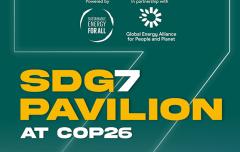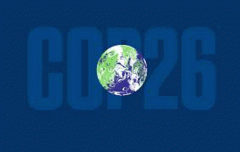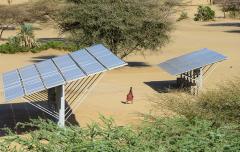Historic alliance launches at COP26 to accelerate a transition to renewable energy, access to energy for all, and jobs
The Global Energy Alliance for People and Planet aims to unlock USD 100 billion in public and private financing in order to:
- Reach 1 billion underserved people with reliable, renewable power;
- Avoid and avert 4 billion tons of carbon emissions;
- Drive economic growth, with 150+ million created, enabled, or improved.
This alliance of philanthropies, multilateral and development finance institutions, and governments also issued a “Global Call for Transformational Country Partnerships” to fast-track solutions in Africa, Asia, and Latin America.
The new Global Energy Alliance for People and Planet (GEAPP) will be launched today at COP26 to accelerate investment in green energy transitions and renewable power solutions in developing and emerging economies worldwide. Over the next decade, the Alliance aims to unlock USD100 billion in public and private capital and tackle three profound human problems simultaneously: (1) POWER – reaching one billion people with reliable, renewable energy; (2) CLIMATE – avoiding and averting four billion tons of carbon emissions; and (3) JOBS – building an on-ramp to opportunity by creating, enabling, or improving 150 million jobs. It also opened a Global Call for Transformational Country Partnerships, inviting developing and emerging economies to apply for technical support and funding to advance ecosystems of clean energy projects.
President Joko Widodo of the Republic of Indonesia commented: “Indonesia is proud to endorse the Global Energy Alliance for People and Planet, which is holding the G20 Presidency in 2022. The initiative brings together the critical stakeholders that must align and co-create a sustainable path for our nations and for our grandchildren. It is our task to restore the triple happiness envisaged by the Balinese Tri Hita Karana three balances – people with people, people with nature, and people with spiritual harmony.”
While energy-poor countries are currently responsible for 25 percent of global CO2 emissions, their share of global emissions could grow to 75 percent by 2050, according to an analysis published today by the Alliance. Yet these countries currently only receive 13 percent of clean energy financing, despite representing nearly half of the world’s population. There are also 243 GW of coal plants being planned, permitted, or under construction in developing countries. If constructed, they would emit 38 billion tons of CO2 over the coming decades, which is nearly the same as total global emissions last year. To change this trajectory and maximize its impact on jobs and livelihoods, the Alliance announced they are providing more than USD10 billion to focus on fossil fuel transitioning, grid-based renewables, and distributed renewables. Alliance partners include:
- Anchor philanthropic organizations: The Rockefeller Foundation, IKEA Foundation, and Bezos Earth Fund;
- Investment partners: African Development Bank Group, Asian Development Bank, European Investment Bank, Inter-American Development Bank, International Finance Corporation, UK’s CDC Group, US International Development Finance Corporation, and World Bank;
- Country partners: Co-Hosts of the 2021 United Nations Climate Change Conference (COP26) Italy and the UK, and Denmark.
“The world is undergoing an economic upheaval, in which the poorest are falling farther behind and being battered by climate change’s effects. Green energy transitions with renewable electrification are the only way to restart economic progress for all while at the same time stopping the climate crisis,” said Dr. Rajiv J. Shah, President of The Rockefeller Foundation. “Providing people with an on-ramp to the modern economy while making real, measurable progress against the existential threat of climate change, the Global Energy Alliance for People and Planet is one of the boldest, most transformative initiatives in our history.”
Changing energy for good
Over the last decade, significant breakthroughs in technology have made renewables the cheapest option for new power in more than two-thirds of the world. For the first time in history, the technology exists to reliably and affordably empower those who lack access to electricity. This in turn boosts human development by creating jobs at a massive scale and advances gender equity through increased accessibility, all the while cutting emissions to avert the climate crisis.
“By replacing diesel generators and coal-fired power plants with renewable alternatives we can reduce carbon emissions quickly. The alliance will work closely with emerging and developing countries who are keen to embrace an inclusive and just energy transition, to bring carbon emissions down and incomes up,” said Per Heggenes, CEO of the IKEA Foundation. “We’re proud to continue to bring together governments, philanthropies, development finance institutions, and the private sector to join us in our collective ambition.”
Through the Global Call for Transformational Country Partnerships, the Alliance is focused on meeting growing demand for power with renewables in place of coal and extending productive-use power to people and communities that either lack access to electricity or have unreliable access. Before the Alliance’s launch, partner members have established relationships in several countries, providing an opportunity to fast-track efforts to pilot breakthrough business models. By working with governments to design and implement their de-carbonization plans and enhance their domestic policy, planning, and regulatory frameworks, the Alliance will help create more favorable investment environments and enable the end-to-end delivery of national transformational programs.
This includes the identification, development, execution, monitoring, and scaling of programs, which will unlock greater levels of investment in clean power sector assets, accelerate equitable energy transitions, and achieve near-term carbon reductions. The Alliance will also de-risk expensive early stages of project development by helping countries test strategies and innovative technologies that may have a higher initial risk profile, and then scale solutions that work.
Partnering for impact
Earlier this year, IKEA Foundation and The Rockefeller Foundation joined forces to commit a combined USD 1 billion to fight climate change and energy poverty. With the addition of Bezos Earth Fund, the catalytic grant capital provided by these anchor partners will unlock billions of dollars in investment capital from multilateral and development finance institutions. The Alliance will use its collective efforts for collaborative action and provide grant funding, technical assistance, and a range of financing options.
“The climate and energy access crises underscore the need for a better way. We must urgently transform our energy system. By bringing the leading technical providers and financing agents together, the Global Energy Alliance for People and Planet is well placed to become the most significant initiative to extend clean, reliable energy to those who don’t have it, while eliminating carbon pollution. In turn, it will create millions of jobs, benefit health, and provide essential development and climate gains,” said Andrew Steer, CEO of Bezos Earth Fund.
In order to increase investment and impact in sub-Saharan Africa, Asia, and Latin America, the Alliance is actively recruiting a diverse set of new partners. RF Catalytic Capital, Inc. (RFCC), the public charity that The Rockefeller Foundation launched in 2020 to enable like-minded funders to pool resources and bring about transformational change, will facilitate the Alliance’s multi-partner investment.
The Alliance will also fund and coordinate with “delivery partners” that will provide significant policy, technical, and project development capacity. In addition to identifying local partners in each market, delivery partners include AtlasAI, COP26 Energy Transition Council (ETC), Energy Sector Management Assistance Program (ESMAP), International Renewable Energy Agency (IRENA), International Solar Alliance, Odyssey, Rocky Mountain Institute (RMI), Sustainable Energy for All (SEforAll), and the U.S. government’s Power Africa program.
Damilola Ogunbiyi, CEO and Special Representative to the UN Secretary-General for Sustainable Energy for All commented: “For 759 million people without electricity, and 2.6 billion people without access to clean cooking solutions, energy poverty is a daily reality that impacts every aspect of their lives. With less than nine years to achieve SDG7, the launch of the Global Energy Alliance for People and Planet could not come at a better time. As a partner, we at Sustainable Energy for All recognize the catalytic role that galvanizing partners and resources can play towards unlocking a just, equitable, and prosperous future for all.”
The Alliance also launched a global mobilization campaign with non-governmental organizations and youth activists to advocate for the long-term changes needed to “Change Energy for Good,” asking people to use #LetsChangeEnergy and add the reason why they want energy changed.
For more information and to access the Global Call for Partnerships, please visit www.globalenergyalliance.org.




